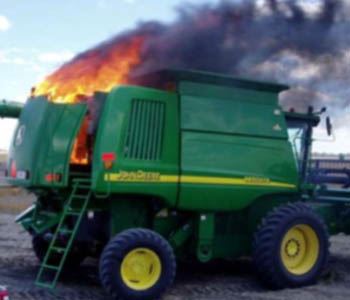12 Harvest Safety Tips
Oct 18, 2019

Harvest Safety Tips
1. Keep the combine as clean as possible. During harvest, frequently blow dry chaff, leaves and other crop materials off the machine. Remove any materials that have wrapped around bearings, belts and other moving parts. Be sure to check those pockets that house wires or lights and where chaff accumulates.
2. Keep wiring and fuses in proper working condition. Check wiring and insulation for rodent damage and replace as needed.
3. Keep fittings greased and watch for overheated bearings.
4. Use a ground chain attached to the combine frame to prevent static charges from igniting dry chaff and harvest residue, letting the chain drag on the ground while in the field.(Click here to see photo)
5. Prior to fueling a hot combine, wait 15 minutes to reduce the risk of a spill volatilizing and igniting.
6. Don’t park a hot combine in the shed or shop. After a long day of harvesting, smoldering hot spots may be present in the combine. If those spots suddenly flare up, at least you won’t lose the building!
7. Keep at least one fully-charged, 10-pound ABC dry chemical fire extinguisher with an Underwriter’s Laboratory approval in the combine cab.
8. Mount a second, larger fire extinguisher on the outside of the machine at a height easily reached from ground level.
9. Have a plan if a fire starts. Turn off the engine; get the fire extinguisher and your phone. Get out and get help.
10. Stay a safe distance away.
11. Call 911 before beginning to extinguish the fire.
12. Approach the fire with extreme caution. Small fires can flare up quickly with the addition of air (by opening doors or hatches).
1. Keep the combine as clean as possible. During harvest, frequently blow dry chaff, leaves and other crop materials off the machine. Remove any materials that have wrapped around bearings, belts and other moving parts. Be sure to check those pockets that house wires or lights and where chaff accumulates.
2. Keep wiring and fuses in proper working condition. Check wiring and insulation for rodent damage and replace as needed.
3. Keep fittings greased and watch for overheated bearings.
4. Use a ground chain attached to the combine frame to prevent static charges from igniting dry chaff and harvest residue, letting the chain drag on the ground while in the field.(Click here to see photo)
5. Prior to fueling a hot combine, wait 15 minutes to reduce the risk of a spill volatilizing and igniting.
6. Don’t park a hot combine in the shed or shop. After a long day of harvesting, smoldering hot spots may be present in the combine. If those spots suddenly flare up, at least you won’t lose the building!
7. Keep at least one fully-charged, 10-pound ABC dry chemical fire extinguisher with an Underwriter’s Laboratory approval in the combine cab.
8. Mount a second, larger fire extinguisher on the outside of the machine at a height easily reached from ground level.
9. Have a plan if a fire starts. Turn off the engine; get the fire extinguisher and your phone. Get out and get help.
10. Stay a safe distance away.
11. Call 911 before beginning to extinguish the fire.
12. Approach the fire with extreme caution. Small fires can flare up quickly with the addition of air (by opening doors or hatches).